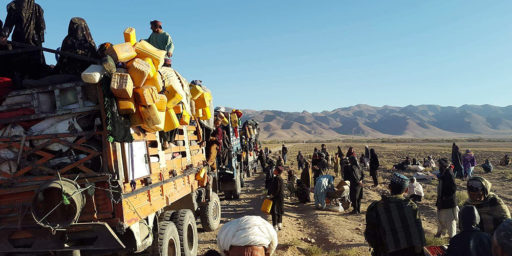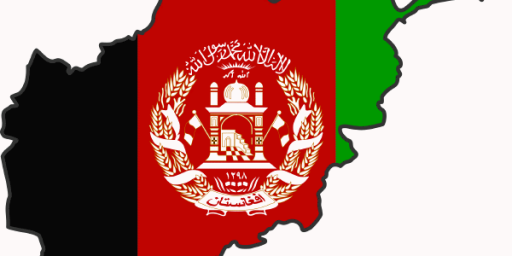NATO’s Not Winning in Afghanistan
Unless we immediately begin a coordinated effort to refocus NATO’s military and civil strategy in Afghanistan, there will be grave consequences for both the region and the Alliance. That’s the consensus among three reports released yesterday afternoon on Capital Hill receiving wide media coverage today, including this piece fronting WaPo.
NATO forces in Afghanistan are in a “strategic stalemate,” as Taliban insurgents expand their control of sparsely populated areas and as the central government fails to carry out vital reforms and reconstruction, according to an independent assessment released yesterday by NATO’s former commander.
“Make no mistake, NATO is not winning in Afghanistan,” said the report by the Atlantic Council of the United States, chaired by retired Gen. James L. Jones, who until the summer of 2006 served as the supreme allied commander of NATO.
“Afghanistan remains a failing state. It could become a failed state,” warned the report, which called for “urgent action” to overhaul NATO strategy in coming weeks before an anticipated new offensive by Taliban insurgents in the spring.
The Atlantic Council report was one of two strongly worded assessments of the war in Afghanistan — both led by Jones — released at a Capitol Hill news conference yesterday. The second was by the Afghanistan Study Group, co-chaired by Jones and Thomas R. Pickering, a former U.S. ambassador to Russia and other nations.
Jones said several steps are needed to “regain the momentum that appears to have been lost” in Afghanistan: a comprehensive campaign plan that integrates security and reconstruction work; the appointment of a United Nations High Commissioner to coordinate international efforts; and a new regional approach to stabilizing Afghanistan that would include conferences with neighboring countries such as Pakistan and Iran.
Progress in Afghanistan “is under serious threat from resurgent violence, weakening international resolve, mounting regional challenges and a growing lack of confidence on the part of the Afghan people about the future direction of their country,” said the report by the Afghanistan Study Group, created by the Center for the Study of the Presidency, which was also involved with the Iraq Study Group.
“The United States and the international community have tried to win the struggle in Afghanistan with too few military forces and insufficient economic aid,” the report said. It highlighted the lack of a clear strategy needed to “fill the power vacuum outside Kabul and to counter the combined challenges of reconstituted Taliban and Al Qaeda forces in Afghanistan and Pakistan, a runaway opium economy, and the stark poverty faced by most Afghans.”
As the Council’s managing editor, I attended the unveiling yesterday, which was under the auspices of the Senate Foreign Relations Subcommittee on Near Eastern and South and Central Asian Affairs. John Kerry, the chairman, observed that, “We shouldn’t have to be reminded about the importance of Afghanistan but, as these reports highlight, we do.” Norm Coleman, the ranking member, agreed that Afghanistan was “a critical front on the war on terror” and urged action.
Typically, reportage of events that I’ve witnessed varies considerably with my own take but the press has been quite good. BBC also has excellent coverage.
 The full report, “Saving Afghanistan: An Appeal and Plan for Urgent Action,” is available in PDF format on the Atlantic Council website, along with the companion piece from the Afghanistan Study Group.
The full report, “Saving Afghanistan: An Appeal and Plan for Urgent Action,” is available in PDF format on the Atlantic Council website, along with the companion piece from the Afghanistan Study Group.
Cernig says this news “should be sobering reading for the Bush cheerleading faction.” Kerry, who obviously would have preferred a different choice for president in the last election, says that the issue here is “presidential leadership” and that the “war of choice” in Iraq is the reason we’re doing so poorly in Afghanistan. Resources being limited, there’s some truth to that. Certainly, the need for Pakistan as an ally in Iraq has complicated counterterrorism efforts on the Afghanistan border.
The point of the reports, though, is not that we’re putting insufficient military resources into Afghanistan or that we’ve “taken our eye of the ball.” Indeed, precisely the opposite. The problem is that — as in Iraq — while we’re making progress on the military front, killing Taliban insurgents in great numbers, we’re not making enough progress on the all-important civil front. The national police are insufficiently trained, reconstruction programs are lagging, infrastructure is poor, jobs are scarce, and drug trafficking is having all sorts of ripple effects.
Yes, we need political consensus to continue and expand NATO’s efforts on the security front. But, much more importantly, we need a coordinated international effort to address all facets of the problem. Both our report and that of the Afghanistan Study Group recommend a High Commissioner-type individual — the wish was for Paddy Ashdown to reprise his superb effort in the Balkans but that hope was dashed on the eve of yesterday’s announcements — to oversee the effort.






“In the battle of Afghanistan, we destroyed the Taliban”
President George W. Bush
USS Abraham Lincoln
At Sea Off the Coast of San Diego, California
May 1, 2003
http://www.state.gov/p/nea/rls/rm/20203.htm
Yea, “Mission Accomplished”
Anybody there bring up the name “Pakistan” in any of these discussions?
Yup. Not a lot in yesterday’s unveiling, which was fairly compressed, but certainly the reports talk about the need for a regional approach.
The Marines have asked that all their efforts be concentrated in Afghanistan. Maybe now’s the time.
See the comment I left to the post above this one.
Failed state? That’s a misconception. To be a failed state you’ve got to have been a state. There’s a swath of ungoverned territory that runs from eastern Turkey to the Hindu Kush parts of which are claimed by a dozen or more countries, none of which have established control over the territory they’re claiming.
As I pointed out not long ago the problem in Afghanistan isn’t just one of putting more troops there. Without a radical restructuring of the entire region there’s no practical way of supplying such a force. The situation is more Fort Apache than Desert Storm.
Dave
Good analyses. You seem to actually analyze the situation some instead of just having a gut reaction then build facts around that gut reaction as many seem to do.
I guess that would depend on what you consider a state. the government which supposedly rules over the “swath of ungoverned territory” in Afghanistan is not the major playing piece in that region. It’s the various tribes that occupy Afghanistan that rule it, and until a plan can be made around integrating them into the country’s future, there will be progress.
This puppet rule in Afghanistan is partial at best, and Democracy doesn’t work everywhere, there are certain political, social, economical and even cultural aspects which must be satisfied.
Take for example Iraq, where most of the people who were given free choice decided it best to use that freedom to kill each other.
Trevor:
Although they have their roles to play tribes, the Red Cross, people with green eyes, and the Elks Club aren’t states. They might have some characteristics in common with states but they aren’t states largely because they don’t behave like states.
Among the defining qualities of states are a defined border, at least a pro forma attempt at defending the border and keeping order within it, inclusivity (in the sense that, within the border, everyone has some relation to the state), and exclusivity (in the sense that, within the border, there’s only one state).
Drawing a border and declaring it’s a state isn’t enough. There must be intent as well and it’s rather clear that areas to which the arm of the national government just don’t reach aren’t part of that state when they don’t intend to be part of that state. In Afghanistan the national government is for practical purposes the government of Kabul and the adjacent area. Wishing the rest of Afghanistan were a state or ever have been won’t make it so.
So then do you believe the so called Territory that makes up Afghanistan can exist in a successful post NATO operation? Or to be more specific do you think it is possible to unify its various inhabitants?
It also seems to me like the people of Afghanistan have been fighting superior armies on and off for hundreds of years and that the Taliban are a more integrated part of the culture there then some terrorist cell operating separate of popular opinion.
I’m not certain of how to answer your questions, Trevor. As I said in the comment linked above I think the alternatives are, basically, stay there forever or be prepared to let Al Qaeda and the Taliban reestablish themselves once we’ve left.